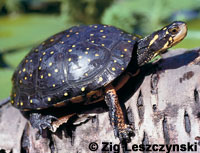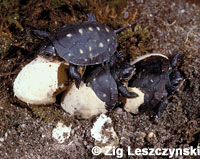Florida Commission to meet on the future of turtles and tortoises.
On April 15, 2009, the Florida Fish and Wildlife Conservation Commission (FWC) will meet in Tallahassee to make two important decisions regarding turtles and tortoises in Florida. This will impact the future of turtles and tortoises throughout the United States and could have a positive impact on the keeping of pet chelonians.
Most of us who have been working for nearly 20 years to stop the killing of thousands of tortoises due to habitat loss hope the state will protect them. To that end, one decision the FWC will make involves changing Florida’s current gopher tortoise conservation plan to ensure viable tortoise populations for future generations. The proposed changes fall short of guaranteeing future populations, but they are steps in the right direction. It will still be necessary to find a way to properly relocate tortoises and to ensure money to monitor and manage the habitats that most tortoises will be living in 50 years from now.
Dealing with any government bureaucracy takes a great deal of patience, fortitude and blood pressure medication. To get to this decision currently facing the FWC, several events took place.
Freshwater Turtle Draft Rule 68A-25.002
The fuse was lit when people witnessed thousands of turtles being loaded into trucks. The turtles were taken from a lake in Gainesville, Fla., and were mostly Florida softshells, but also mud turtles and other species. This event made news, infuriating many. The FWC called a meeting, which included many upset turtle herpetologists such as myself, to discuss what should be done.
It became obvious that large numbers of turtles were not being taken from the wild primarily to supply the pet trade. They were being taken to supply the Chinese food trade. Everyone was surprised at the actual tonnage of turtle meat that was being shipped to China each month, driven by a growing middle class that could afford a luxury such as turtle meat.
Then a miracle occurred! All the researchers and scientists, who were either working in Florida or with Florida species, worked together to craft a letter to Governor Charlie Chris, asking for his support in protecting the state’s great diversity of chelonians. Chris, who has also acted on behalf of gopher tortoise and manatee conservation, asked for a careful review by the FWC and its commissioners.
This eventually resulted in a proposed rule — Freshwater Turtle Draft Rule 68A-25.002 — that should actually work to protect turtles from being overly exploited. It does so without kids and other hobbyists having to give up their right to keep pet turtles. The rule also should not impact those of us who conduct captive breeding of chelonians by having a permitting process that would allow some take of turtles for breeding stock. It should be noted that there are many guidelines or details to be put into place once the regulations have been approved.
The rule is not yet passed. It will in fact have another hearing by the Commission three months from April 15th with public hearings in between. This reasonable rule — potentially one of the best for protecting turtles in a reasonable way – could still be changed, however. There are groups against the keeping of reptiles and amphibians as pets. We must remain aware and vigilant in protecting our rights to keep these wondrous animals.
Saving Spotted Turtles
I love spotted turtles. The first time I saw one I hyperventilated just as much as I did when I saw a rhino 50 feet away, or when I jumped off a ship to find myself eyeball to eyeball with a giant blue whale. To me, the spotted turtle is the perfect poster child to promote the captive breeding and maintenance of pet turtles and the role both play in their future conservation.
Virtually all states within the spotted turtle’s range have rules and regulations that prevent their collection for commercial use. Some don’t allow any collection at all. This is not the case, however, in Florida. Spotted turtles are extremely rare in Florida and are known to originate from only three or four locations.
Because the spotted turtle is protected everywhere throughout its range except in Florida, wild Florida spotted turtles, usually adults, are sometimes seen for sale. There have been reports of some that have markings or pit tags that were placed on them by researchers thousands of miles from Florida. Such turtles would be illegal to sell.
Freshwater Turtle Draft Rule 68A-25.002 would stop the illegal sale of these spotted turtles by outlawing the take and sale of non-captive-bred turtles and tortoises in the state. This would effectively close a loophole in which North Carolina spotted turtles are collected and driven down I-95 to be marketed as “rare Florida spotteds.”
Spotted turtles are easy to breed in captivity. As seen at many reptile expos, hatchlings and subadults are plentiful, and they are sold legitimately and at good prices. These captive-bred turtles, as is the case with most reptiles, generally fare better in captivity and live longer than wild-caught animals.
Do the Best Thing
Support legislation, such as Freshwater Turtle Draft Rule 68A-25.002, that fights the often-incorrect arguments that some conservationists and animal rights activists continue to push down the throats of ignorant legislators.
And always advocate the purchase of captive-bred reptiles. Turtle breeders, as well as turtle farmers in the turtles’ home countries, can provide the proper habitat, food and husbandry for just about any species of pet turtle. If you buy captive-bred turtles, not only will you get stronger, healthier animals, you will promote the conservation of both the turtles and their natural habitats. Support captive breeders through your purchases and the support of those who sell turtles ethically.





